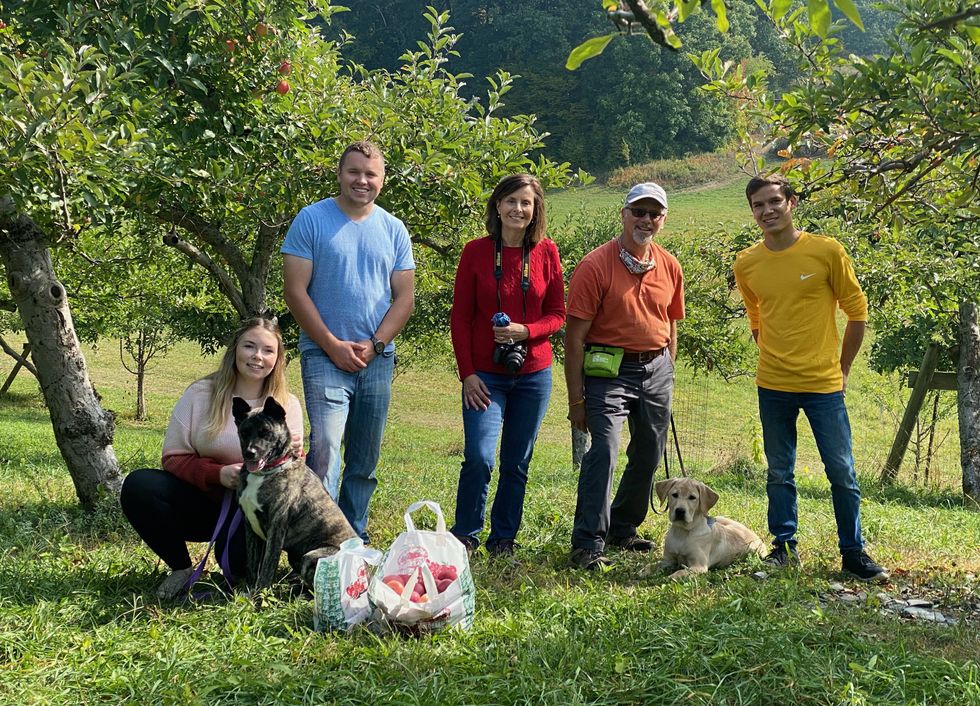MILLBROOK — People usually think of retirement as a time to relax and enjoy some leisure time — time to relax and take it easy. That may be true for some, but that is not the case for Pam Freeman. After all, she spent the last 20 years working at the Cary Institute of Ecosystem Studies in Millbrook, first with its education projects and then moving to its communications department. One would think she might have been ready to find a quiet spot to relax and perhaps settle down with a good book after retiring, but that really isn’t her nature, as her family and friends can attest to.
Hers is a life that revolves around altruism, and it’s a family tradition. She and her husband, Denis, adopted their two sons. Alex is from Russia and Scott is from Kazakhstan.
According to the Freemans, the process for both adoptions were quite an adventure; things did not go easily. After the initial process of adopting Alex lagged, they started the process for Scott. They were overjoyed when they ended up with both children.
Born and raised in Pleasant Valley, Pam still lives there with her family. She only left to attend Endicott College in Massachusetts.
However, the Freemans have been closely aligned with the Millbrook community through their affiliations with Grace Church, and of course, the Cary Institute. Both Pam and Denis have been very active with the church during the past 25 years, tirelessly fundraising for events like the annual golf outing before the COVID pandemic. She also worked tirelessly for the concert Grace presented online last winter. She’s also taught at the church and served on its advisory board.
Her husband is the food pantry coordinator at St. Thomas Episcopal Church in Amenia Union, which is affiliated with Grace Church and distributes food to roughly 500 families per month.
Now that she is retired, Pam said she’s more busy than ever. She has gotten involved in raising seeing eye dogs for Guiding Eyes for the Blind. That means she is responsible for the care of the dogs when they are only puppies, and raises them to be guide dogs for the blind. To qualify as a trainer Pam and her family had to meet the criteria as caring, giving and responsible people.
She said she gets attached to each puppy, but knowing they are going to loving homes where they will make a difference makes it all worthwhile. It’s hard work, as the family must attend classes and go on outings to socialize the pups and prepare them for their life’s work, which includes being out in public with their humans.
The Freemans’ dogs in training have been to the Red Rooster drive-thru for lunch and to Kirby Hill Farm as well as to Joey’s Ice Cream — Pam said they all had a great time. They are now training their third dog and anticipating training their fourth.
The family usually gets the puppies at about 8 weeks of age, but during the pandemic they are started getting them at about 4 weeks old. They usually keep them until they are 16 to 18 months old.
Not every dog becomes a guide dog, said Pam, as sometimes it becomes obvious during training that the dogs should be placed in other programs, such as Exceptional Sidekicks, which provides therapy and service dogs to disabled teens in need.
Pam said her family’s involvement with training the seeing eye dogs has brought them new friends and introduced them to a new community.
Her sons are now grown. Alex works at Grace Church and is teaching his mother to play the piano, a life-long desire.
“It gets harder as you get older,” she said.
Scott is a firefighter in nearby Poughkeepsie.
Pam, ever occupied, is already working on the Grace Church’s next golf outing, which this year will be held at the ice arena in Poughkeepsie come September.
Clearly, Pam Freeman is keeping plenty busy during her retirement, staying productive and very satisfied. Her life continues to revolve around doing for others, her family, her community and just about anyone she feels her actions will help make life just a little bit better for — and just like when she was working, now that she’s retired, that seems to continue to open up a whole wide world of possibilities.









 Submitted
Submitted






